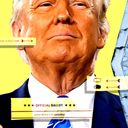Trump hopes semantics will save him at Supreme Court on Colorado case

Legal experts broadly agree about what the Supreme Court probably wants to do on Thursday — find the narrowest, most boring way to let former President Trump back on the ballot in Colorado.
Why it matters: There aren't any great options to do that, and the stakes — for the court itself, the outcome of a presidential election and the public's trust in the democratic process — are as high as they've been since Bush v. Gore.
Catch up quick: The court is hearing oral arguments starting at 10am ET Thursday over whether Trump can appear on the Colorado GOP primary ballot. A handful of other states have also taken steps to remove him.
- Colorado's Supreme Court ruled in December that Trump engaged in an insurrection on Jan. 6, is therefore ineligible to be president, and thus cannot be on the ballot.
- It cited the 14th Amendment, which bars former "officers of the United States" who "engaged in insurrection or rebellion" against the U.S. from holding "any office."
Trump's lawyers have pinned their hopes mainly on semantics. They argue that the insurrection clause doesn't apply to the president; that Jan. 6 wasn't an insurrection; and that even if it was, Trump did not "engage" in that insurrection.
- Persuading the justices of any one of those points would be enough to win.
- But appearing to exonerate Trump for Jan. 6, or ruling that the 14th Amendment allows for an insurrectionist president, would open the court up to a firestorm of criticism.
"Officer"
The insurrection clause applies to people who served as "officers of the United States" and took an oath to "support the Constitution," then engaged in an insurrection.
- That doesn't include the president, Trump's lawyers argue — only lower-level positions.
- Trump's lawyers note that the presidents swear an oath to "preserve, protect and defend" the Constitution. The word "support" does not appear. They also point to other parts of the Constitution that refer to the president and "officers" separately.
The other side: The voters seeking to remove Trump from the ballot argue the presidency is plainly an office of the U.S. — and that it's nonsense to assume the drafters of the 14th Amendment intended to keep insurrectionists out of lower levels of government, but were fine with one becoming commander-in-chief.
"Engaged"
"President Trump never told his supporters to enter the Capitol, and he did not lead, direct, or encourage any of the unlawful acts that occurred at the Capitol," his lawyers wrote in a brief to the high court.
- Encouraging your supporters to "fight like hell" or "take our country back" is not "engaging in insurrection," they argue, but normal political rhetoric, protected by the First Amendment.
The other side: The plaintiffs lay out a long record of tweets and other public statements from Jan. 6 and the days leading up to it, in which Trump claimed the election results were fraudulent and that the certification of those results could be stopped.
- His message was "intended as, and was understood by a portion of the crowd as, a call to arms," the Colorado Supreme Court ruled.
Between the lines: The evidentiary findings of Colorado's state courts are the only formal mechanism that has decided whether Trump engaged in an insurrection.
- That's a pretty sweeping decision for a state court to reach on its own, and demanding a more thorough process might seem like an easy out for the high court.
- Still, the justices may be wary of ruling outright that Trump didn't engage in an insurrection.
"Hold office"
Trump's lawyers also note that the 14th Amendment says people who engaged in an insurrection cannot "hold office." It doesn't say they can't run for office.
Reality check: States frequently keep candidates off the ballot when they're not eligible for the office they're seeking — because they're too young, for example, or weren't born in the U.S. The basic idea is that voters deserve to have their actual choices presented to them.
- The question is whether that's what happened here, or whether Colorado actually created a new and unconstitutional system that gives state courts too much leeway to define "insurrection" however they want, and alter the course of presidential elections in the process.
- Several friend-of-the-court briefs in this case wrestle with that question — some of the smartest ones don't even attempt to answer it, just to help the justices think through it intelligently.
The bottom line: Most Supreme Court observers think keeping a party's presumptive nominee off the ballot is simply too big an intervention for the court to stomach.
- But this isn't just about 2024. Ruling one way could make it all but impossible to enforce basic eligibility standards for elected office; another could make it too easy for states to thwart legitimate candidates.